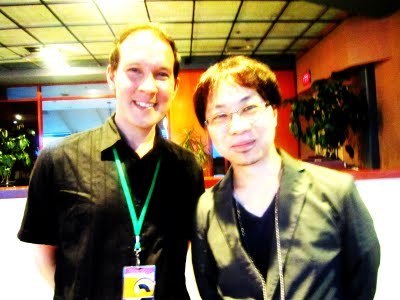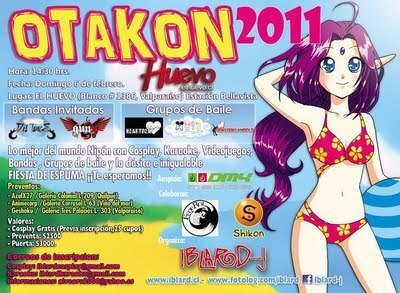Roland Kelts's Blog, page 69
August 3, 2011
Junot Diaz tonight in Tokyo
 If you're in Tokyo, check out Junot Diaz's (Oscar Wao, Drown) reading tonight. Info:
If you're in Tokyo, check out Junot Diaz's (Oscar Wao, Drown) reading tonight. Info:Event: Junot Diaz talk with Koji Toko and Ono Masatsugu
Date/Time: Aug. 4 (Thurs.), 2011 19:00~
Place: Second Floor Conference Hall, The Nippon Foundation (Minato-ku Akasaka 1-2-2, Tokyo)
Speakers: Junot Diaz, Masatsugu Ono (author), Koji Toko (translator)
Free-of-charge. Capacity = 100 people.
*Please sign up in advance!
To sign up, please contact:Shinchosha Publishing Division email: diaz@shinchosha.co.jp TEL:03-3266-5411(13:00~17:00)
FAX:03-3266-5852
And here's Junot rhapsodizing about Tokyo.

Monkey @ Figment
 My thanks to Dana Goodyear and Lindsay Van Thoen of Figment for inviting me to prattle on about Issue 1 of
Monkey Business: New Voices from Japan
, which is still available at some bookstores and via the A Public Space website.
My thanks to Dana Goodyear and Lindsay Van Thoen of Figment for inviting me to prattle on about Issue 1 of
Monkey Business: New Voices from Japan
, which is still available at some bookstores and via the A Public Space website. We will be hosting Canadian launch events for Issue 1 in Toronto next month (details TBA), and Issue 2 is well under way, with a targeted pub date in Feb/March 2012, and a second round of NYC launch events to follow in Spring 2012.
Monkey Business with Roland Kelts
Roughly two years ago, my dear friends Motoyuki Shibata—a Japanese writer, scholar and translator of American literature—and Japanese literature translator and scholar Ted Goossen, the editor of the Oxford Book of Japanese Short Stories, approached me with a singular mandate: please help us publish an annual English-language journal of contemporary Japanese stories, poems, and art for a western audience. In 2008, Shibata founded a new literary magazine in Tokyo called Monkey Business, modeled in part by Brooklyn's A Public Space—for which he and I had curated and edited a portfolio on contemporary Japanese fiction for Issue 1 in 2006.
At first I was skeptical: American literary journals sometimes feature foreign fiction in translation, but usually as exotic inserts tucked into the dominant domestic discourse. But Shibata has persuaded me that there is a convergence of literary sensibilities in Japan and the US right now. Fiction writers from both countries seem to be responding to the cataclysmic events of the late-20th and early 21st Century with an intimate strain of surrealism—personal dream narratives anchored in the experiences of childhoods, families and neighborhoods, which may be an organic or even helpless narrative cry against the rain and reign of chaos–natural disasters, endless, faceless wars and disrupted personal and political narratives. [more @figment]
August 2, 2011
Makoto Shinkai
 With anime auteur Makoto Shinkai (5CM per Second; Voices from a Distant Star; Children who Follow Lost Voices ...) @ Otakon 2011, Baltimore, MD.
With anime auteur Makoto Shinkai (5CM per Second; Voices from a Distant Star; Children who Follow Lost Voices ...) @ Otakon 2011, Baltimore, MD.
August 1, 2011
Ota-kontroversy?
 The oddities of Otakon
Baltimore's ever-growing celebration of Japanese pop has everything from kiddie cartoons to apocalyptic fantasies
The oddities of Otakon
Baltimore's ever-growing celebration of Japanese pop has everything from kiddie cartoons to apocalyptic fantasiesBy Michael Sragow, The Baltimore Sun
3:25 PM EDT, July 29, 2011
A man in black wields an enormous hollow cross packed with phony handguns while checking out Barnes & Noble's graphic-novel racks. A futuristic Marie Antoinette, in a regal gown with bared cleavage and midriff, balances a huge rectangular headpiece with impeccable hauteur while navigating the steaming crowds on Pratt Street. An urban-cowboy assassin in fringed Daisy Dukes, with hippie-like straight hair hitting the small of her back and bandoleros crisscrossing her chest, eyes a burger at Five Guys.
These are the kinds of sights that have filled Baltimore's downtown and Inner Harbor since Thursday night, when Otakon 2011 opened with a block party.
Every summer, Otakon, a celebration of Asian popular culture, turns Baltimore into the double-take capital of the world. At least 30,000 fans, most from the East Coast, and many in costume, have entered the Baltimore Convention Center this weekend to salute Japanese cartoons, comics and video games. The extravaganza winds up Sunday.
It's a boon to Baltimore — it brings an estimated $11.3 million into the city — and a tourist attraction unto itself. Any noninitiates wandering through the Inner Harbor are sure to collide with the creative, colorful aficionados. Chances are you could see a Spider-Man, Superman or Han Solo in this wild bunch. But almost all the action figures who spring to life at Otakon have stepped out of anime (Japanese cartoons) and manga (Japanese comics).
"We have women dressing in male character costumes, and we have men (sometimes even old men) dressing as Sailor Moon, a teenage princess fighting for truth and love," according to Sue Monroe, Otakon 2011's head of volunteer operations. For these "cosplayers" — conventioneers who combine costuming and role-playing — what counts is staying true, in their own ways, to each character, even if their far-out ensembles are hard to keep up in more ways than one.
Otakon is an extension of the Japanese word otaku, meaning a person immersed in pop culture. In Japan, the word carries some pejorative connotations — it often suggests an obsessive young fellow who mooches off his parents, sleeps in Internet cafes and generally can't function in reality. But in an America newly proud of geeking out, there's no comparable stigma attached. Many American fans are proud to call themselves "totally otaku."
Attendance at Otakon has nearly tripled, from 10,275 in 2001 to 29,274 in 2010. According to Otakon featured speaker Roland Kelts, the half-Japanese, half-American author of "Japanamerica: How Japanese Pop Culture Has Invaded the U.S," the success of conventions like Otakon — the largest of its kind on the East Coast — mirrors the new-millennial embrace of Japan as an international trend-setter.
"In the 21st century," Kelts said, "Japan has become the arbiter of 'cool' around the globe, in fashion, design, style, cuisine, and certainly in this vein of bright, colorful and inventive popular culture."
Kelts also noted that as the otaku phenomenon surges across the country, Americans are becoming more aware of the extremes of Japanese popular culture. In Kelts' book, a chapter called "Strange Transformations" includes his rendering of a yakuza (Japanese mafia) manga story — the characters include a torture victim, a buxom sexual tease and a snake — and his summary of the genre known as "tentacle porn," depicting women ravished by incubi with diverse appendages. [more @Baltimore Sun here]
July 30, 2011
Baltimore Sun on Otakon signings
Roland Kelts, who is appearing on  four panels during Otakon, will also be signing copies of his book, "Japanamerica: How Japanese Pop Culture Has Invaded the U.S.," throughout the weekend. One of Kelts' themes in this smart, zesty guide to the interface of Japanese and American pop is the twin-like connection of the cultures. His favorite metaphor is the Mobius strip, a twisting surface with one continuous side. In a 2007 epilogue Kelts asks readers to envision "the strip in motion -- whirling through the winds of the Pacific and DSL, cable, and satellite TV signals, crisscrossing the fifty states and beyond" to get "a clearer picture" of the phenomenon "tying the two countries ever closer together."
four panels during Otakon, will also be signing copies of his book, "Japanamerica: How Japanese Pop Culture Has Invaded the U.S.," throughout the weekend. One of Kelts' themes in this smart, zesty guide to the interface of Japanese and American pop is the twin-like connection of the cultures. His favorite metaphor is the Mobius strip, a twisting surface with one continuous side. In a 2007 epilogue Kelts asks readers to envision "the strip in motion -- whirling through the winds of the Pacific and DSL, cable, and satellite TV signals, crisscrossing the fifty states and beyond" to get "a clearer picture" of the phenomenon "tying the two countries ever closer together."
Kelts told me earlier this week that when he was growing up in New England in the 1970s and 1980s, "Japan was anything but cool. It was not cool to tell my friends that my mom was Japanese. Japan was this strange, distant, alien place, where they ate raw fish, which most Americans then found disgusting. The Japanese were supposed to be our evil competitors – they all were supposed to be conformists, wearing suits to work and doing jumping jacks to the company anthem. But in the 21st century Japan has become the arbiter of 'cool' around the globe, in fashion, design, style, cuisine, and certainly in this vein of bright, colorful and inventive popular culture." [more @ Baltimore Sun here]
July 27, 2011
Otakon 2011 update

 With
Otakon
, the East Coast's largest annual anime convention, merely a day away, here's the preliminary schedule for my panels:
With
Otakon
, the East Coast's largest annual anime convention, merely a day away, here's the preliminary schedule for my panels:7/29/2011 10:00 AM 11:00 AM - Japanamerica Book Intro & Background
7/29/2011 4:00 PM 5:00 PM - Japan's Apocalyptic Imagination
7/30/2011 12:00 PM 1:30 PM - Multi-Polar Pop Culture
7/31/2011 12:00 PM 1:30 PM - Japan's IP Challenge
Copies of Japanamerica will be on sale throughout the convention, thanks to the largess of Jim Vowles, Connor Cochran and tireless publicist Siobhan Paganelli, and there will be at least two official book-signing / meet & greet sessions. Oh, and anime auteur Makoto Shinkai ( 5 CM Per Second ) will be on hand--worth admission alone, as they say.
See you under the sun at Baltimore's Inner Harbor.
July 26, 2011
Pacific Rim Diary 4: Tohoku, Tokyo, US Media for NPR
 I asked ABC News Correspondent Akiko Fujita to join me in the studio in Tokyo for my latest "Pacific Rim Diary" segment on The Madeleine Brand Show for KPCC/NPR. I talk about returning to a transformed Tokyo in May, and Akiko and I discuss how the US media misread parts of the story--and the Japanese themselves.
I asked ABC News Correspondent Akiko Fujita to join me in the studio in Tokyo for my latest "Pacific Rim Diary" segment on The Madeleine Brand Show for KPCC/NPR. I talk about returning to a transformed Tokyo in May, and Akiko and I discuss how the US media misread parts of the story--and the Japanese themselves. You can hear it here .
Website copy: It's been over three months since an earthquake off the coast of Japan triggered a tidal wave that nearly caused nuclear meltdown. American news teams had heavy coverage of the devastation and threat to the Fukushima Daiichi nuclear plant, but according to Japanese-American author Roland Kelts, the U.S. media missed the point. Kelts joined us in the U.S. right after the disaster in Japan. Now he and ABC News correspondent Akiko Fujita explain from Tokyo.
July 20, 2011
Blissfully unbewared ...

July 19, 2011
Meiji Monday
 Roland Kelts is a half-Japanese American writer, editor and lecturer who divides his time between New York and Tokyo. He is the author of <<http://www.scpr.org/programs/madeleine-brand/2011/02/15/sometimes-comedy-doesnt-travel-pacific-rim-diary-w/>," and the author of a weekly column for
Roland Kelts is a half-Japanese American writer, editor and lecturer who divides his time between New York and Tokyo. He is the author of <<http://www.scpr.org/programs/madeleine-brand/2011/02/15/sometimes-comedy-doesnt-travel-pacific-rim-diary-w/>," and the author of a weekly column for<http://www.yomiuri.co.jp/dy/features/arts/T110214005577.htm> The Daily Yomiuri newspaper. His latest project is the English edition of the Japanese literary culture magazine,
<http://www.apublicspace.org/pre-order_monkey_business.html> Monkey Business, and his blog is:
July 8, 2011
Manga: legitimately digital at last?
 As the North American "con season" kicked off last weekend with the Anime Expo convention in Los Angeles, the 39-member Digital Comic Association announced its long-awaited digital manga Web portal, JManga.com, would be officially unveiled at the July 21-24 Comic-Con International in San Diego. A midday panel discussion on the state of the manga industry, featuring heavyweights from Kodansha, Shueisha, Kadokawa Group Publishing Co. and Futabasha Publishers Ltd., will be followed by an evening reception and a "sneak peak" at the first major legitimate gateway for digital manga.
As the North American "con season" kicked off last weekend with the Anime Expo convention in Los Angeles, the 39-member Digital Comic Association announced its long-awaited digital manga Web portal, JManga.com, would be officially unveiled at the July 21-24 Comic-Con International in San Diego. A midday panel discussion on the state of the manga industry, featuring heavyweights from Kodansha, Shueisha, Kadokawa Group Publishing Co. and Futabasha Publishers Ltd., will be followed by an evening reception and a "sneak peak" at the first major legitimate gateway for digital manga. While long overdue, the project marks a revealing convergence. Crunchyroll.com, the former fansite turned legit in 2009, has helped the DCA with system development of the Jmanga site via a partnership with Bitway Co., a Japanese e-book company launched by neolithic printing giant Toppan Printing Co. In other words, guerrilla-style, close-to-the-community fansite staffers were tapped by some of the biggest industry veterans to create an official digital portal for manga.
 The DCA-Crunchyroll partnership is not the only industry-fansite tie-up on the horizon. Mangareborn.jp, currently in beta and planning to go live in August, seeks to work directly with manga artists who want to reach an international audience, bypassing Amazon, Apple and possibly even publishers ... [more @ Yomiuri here]
The DCA-Crunchyroll partnership is not the only industry-fansite tie-up on the horizon. Mangareborn.jp, currently in beta and planning to go live in August, seeks to work directly with manga artists who want to reach an international audience, bypassing Amazon, Apple and possibly even publishers ... [more @ Yomiuri here]



